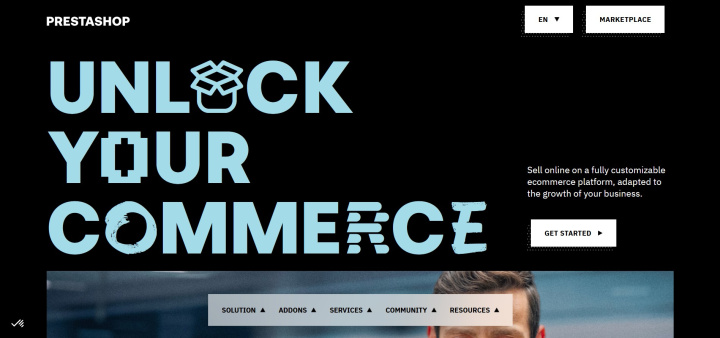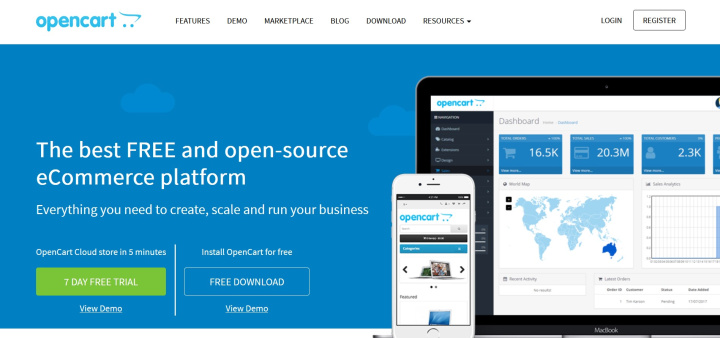Shopify vs. Other E-Commerce Platforms
The Canadian company Shopify, which has been successfully developing its product since 2006, is a confident leader in the e-commerce platform market today. Nevertheless, it has quite strong competitors. We invite you to familiarize yourself with the most popular alternatives to Shopify. In our article, you will learn about their capabilities, thanks to which they have managed to win the trust of digital business representatives.
What Is the Shopify Platform
Shopify is deservedly considered one of the best e-commerce platforms. It is used daily by over two million users from more than 170 countries, and the number of online stores created on it has exceeded 4.8 million. This SaaS platform allows you to sell goods and services through personal websites, social networks, and marketplaces.

Key features:
- The service is suitable for selling physical and digital products, subscriptions, online booking services, gift cards, online courses and training, tours, event tickets, and much more.
- Entrepreneurs can easily and quickly create a full-fledged online store using the built-in drag-and-drop builder and a library with more than 100 theme templates (about 20% are free).
- Developing an online store on Shopify does not require any web design or programming skills. To create a layout, ready-made blocks are used, and design elements are configured in a convenient editor.
- The Shopify Magic module automatically generates text descriptions of products, eliminating the need for users to write them themselves. You just need to indicate the key characteristics of the product. AI algorithms will do the rest of the work.
- The platform provides a wide range of functions for promotion and marketing: audience segmentation, targeted advertising, campaign analysis and reporting, feedback monitoring. Plus, it gives you access to tools for audience engagement (Shopify Email and Shopify Inbox), content marketing, SEO, and more.
- Entrepreneurs can manage inventory in the Inventory section, add an unlimited number of contacts to the database, send forgotten cart reminders, and other types of notifications. The system supports several formats of promotional campaigns and discounts: for certain product categories, delivery, the number of items in an order, etc.
- Users have access to many widgets to expand the standard functions of the system, as well as over 6,000 integrations with third-party programs from different categories.
The Shopify pricing structure consists of 4 plans:
- Basic (for individual entrepreneurs) – $24 per month.
- Shopify (small business) – $69 per month.
- Advanced (for medium business) – $299 per month.
- Plus (for large businesses) – $2300 per month.
BigCommerce
The BigCommerce platform is considered one of the best alternatives to Shopify. It is suitable for both beginners and experienced entrepreneurs. The service offers a comprehensive range of tools and integrations with third-party programs, including international payment systems. As of 2023, it has hosted over 60,000 online stores from more than 150 countries.

Key features:
- The platform allows users to manage multiple online stores through a single dashboard and add an unlimited number of products to their catalogs.
- Users can create and customize online store designs using a no-code drag-and-drop editor. Additionally, it can be integrated with WordPress.
- BigCommerce offers over 200 paid and free design templates that are fully responsive and easily customizable using HTML, CSS, and JavaScript tools.
- Entrepreneurs have access to more than 70 types of discounts and promotions to boost sales.
- Built-in SEO tools, such as editing meta data and robots.txt, help increase website traffic.
- The catalog management module includes over 600 product parameters. Each parameter has a unique article number (SKU) for accounting automation. The bulk processing feature speeds up categorization. Moreover, the system allows users to add custom fields and upload up to 20 files for each product.
- A multilingual interface, support for over 100 currencies, and global and local payment services make it easy to create localized versions of online stores for different countries.
When comparing BigCommerce vs Shopify, users are particularly interested in pricing. Firstly, it's important to note that this platform does not charge transaction fees and allows users to set their own shipping costs. The subscription fee is fixed based on the following plans:
- Standard – $29 per month.
- Plus – $79 per month.
- Pro – $299 per month.
- Enterprise – the cost is calculated individually and is available upon request.
The indicated prices are valid for annual payments. If you choose monthly payments, the cost will be 25% higher. Each plan comes with a 15-day free trial.
WooCommerce
WooCommerce is one of the top plugins for developing ecommerce sites on the WordPress platform. It is quite popular among online entrepreneurs. As of today, it powers over 5 million online stores, and the total number of plugin downloads exceeds 84 million.

Key features:
- WooCommerce easily connects to any WordPress site, turning it into a full-fledged online store.
- The catalog contains about 100 design templates for e-commerce websites for different areas of business: electronics, digital technologies, fashion, beauty and health, games, sports, and so on. These include block-based, responsive, and free themes.
- Over 800 paid and free extensions are available to users. All of them are organized into thematic categories: payments, delivery, marketing, store management, customer service, merchandising and more.
- The Gutenberg block editor is one of the main advantages of this platform when comparing WooCommerce vs Shopify. It allows you to flexibly customize templates, carefully customizing each design element.
- A convenient admin panel allows you to add products to the catalog in a couple of clicks. The Product CSV Import Suite extension automates the bulk loading of product items.
- The platform supports different languages and currencies, tracking the geolocation of visitors and automatically loading a localized version of the site.
- Users can integrate their online store with a number of third-party platforms (Amazon, eBay, TikTok Shop, Walmart) to automatically exchange data between them.
WooCommerce is one of the best Shopify free alternatives. Basic platform functions are available for free. You will only be charged for certain design templates, extensions, and additional features (such as auto tax calculation). In addition, you will need to pay for hosting (from $3.99 per month), domain (from $15 per year), and payment processing (2.9% + $0.30 per transaction).


Set up WooCommerce integrations to automate workflows. With the help of our service, you will be able to implement automation without special knowledge and skills.
Shift4Shop
Online store builder Shift4Shop is one of the well-known competitors of Shopify. The project was launched in 2001 under the brand name 3dcart. It received its current name after a rebranding carried out in 2020.

Key features:
- The platform has a built-in CRM with a set of useful tools for interacting with customers and analyzing business indicators.
- Users have access to a solid library with more than 100 free templates for e-commerce on various topics: auto parts, electronics, accessories, garden, beauty and health, photography, jewelry, education, music, and so on.
- Each theme is mobile-friendly and easy to customize. Using a drag-and-drop editor or HTML editor, you can add or remove certain blocks, change colors, fonts, and other design elements.
- Shift4Shop allows you to add an unlimited number of products to the catalog. The service provides free hosting and the service of transferring an online store from a third-party platform. Additionally, users get access to APIs and domain registrations.
- Integrations with a number of third-party systems are supported, including Facebook, Google, AWeber, Mailchimp, and many others.
The platform is classified as one of the cheaper Shopify alternatives, as it provides one of the most comprehensive free plans. Users are given free access to all platform features if they meet just two requirements:
- monthly revenue from the sale of goods or services – at least $500;
- mandatory use of the Shift4Shop payment gateway, which charges a transaction fee.
If your monthly revenue is less than $500 or you don’t want to pay commissions, you can sign up for the service’s basic paid plan. Its cost starts from $29 per month. By selecting it, users get full access to all system tools and can also choose payment systems at their discretion.
PrestaShop
Founded in 2007, the French platform PrestaShop today continues to hold the status of one of the best Shopify alternatives. At the time of writing this article, it hosts more than 300,000 online stores, mostly from the US and Europe.

Key features:
- The platform is open source. It provides maximum customization with free editing of program code, allowing you to flexibly adapt the design and UI of an online store to individual needs.
- The built-in marketplace provides over 3,000 design templates, as well as over 4,000 modules, training materials, and other content. Users have access to extensions for accepting payments, delivery, integration with social networks, setting up and managing stores, GDPR compliance, and more.
- PrestaShop integrates with over 200 payment providers, including PayPal, Stripe, Amazon Pay, and Square. In addition, the service has its own PrestaShop Checkout processing, support for bank transfers and checks.
- The platform ensures the security of online stores hosted on it by issuing them a free SSL certificate.
- Setting up meta tags for SEO is available.
- Entrepreneurs can stimulate sales using marketing tools: email marketing, free shipping, limited-time promotional offers, discounts, coupons, and so on.
When comparing PrestaShop vs Shopify, it is worth noting an important advantage of the first platform – the completely free basic plan Classic. Those wishing to take full advantage of its functionality are offered the Hosted plan with hosting (50 GB), technical support and e-commerce services for €24 per month.
Extend the possibilities of working with PrestaShop with the help of integrations. Connect this platform with third-party systems using the ApiX-Drive connector. Setting up integrations for PrestaShop is done through the web interface in no-code mode.
OpenCart
Our selection is completed by the open-source e-commerce platform OpenCart – one of the popular alternatives to Shopify today. It is especially successful among small businesses, as it allows you to launch an online store with minimal or no costs.

Key features:
- Entrepreneurs can manage multiple e-commerce sites through a single administrative panel. This is where data on sales, revenue, customers, and other business metrics are posted.
- The OpenCart marketplace contains more than 13,000 themes and extensions. This quantity allows you to choose the optimal design for a store of any subject, make its interface multilingual, and connect different payment and delivery methods.
- The widget catalog is conveniently sorted by thematic categories (themes, modules, reports, and so on). Users can view only paid or free extensions, filter them by date added, rating, price, or platform version.
- Collaboration tools give you the ability to add administrators, support staff, and other specialists. Supports management of rights and privileges for groups and individual users.
- Marketing features (discounts, coupons, promotional offers) will help increase sales, and the affiliate program will provide additional income.
The OpenCart platform is one of the best alternatives to Shopify, in particular because it is completely free to use. There is no monthly fee. The paid all-in-one solution OpenCart Cloud provides a ready-made online store hosted by Amazon. It offers several tariff plans for companies of different sizes:
- Bronze (1 CPU, 2GB) – $59 per month.
- Silver (2 CPU, 4GB) – $99 per month.
- Gold (4 CPU, 8GB) – $199 per month.
OpenCart Cloud does not charge any transaction fees. Each plan comes with a 7-day free trial.
Conclusion
Shopify is still one of the top e-commerce platforms, but it has many worthy competitors. In this article, we looked at the key features of the most popular services today. Despite the fact that they are aimed at small and medium-sized businesses, not all platforms can be called cheaper alternatives to Shopify. Some (for example, OpenCart Cloud) cost more than the standard Shopify plan for their basic paid plan. However, this is partly compensated by the presence of free functions and tools that allow novice entrepreneurs to launch their own online store without significant investment.

